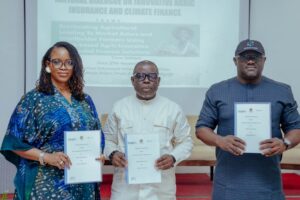
Government funding has long been recognised as a critical enabler of research and development, particularly in addressing complex challenges that require innovation and long-term investment. Across the world, strategic funding from public institutions has fueled transformative projects, from advancing renewable energy technologies to breakthroughs in medical science. For Nigeria, such investments are not just a means of catching up with global innovation trends but an imperative to harness local resources and expertise for sustainable development.
In Lagos State, the government has taken a bold step toward this vision by establishing the Lagos State Science Research and Innovation Council (LASRIC). This body represents a strategic commitment to promoting research-led solutions for local challenges. One standout example of LASRIC’s impact is its partnership with Lagos State University’s Centre of Excellence for Sargassum Research (CESAR). Established in 2020, CESAR has positioned itself as a pioneer in transforming sargassum, a proliferating seaweed often seen as an environmental nuisance, into an invaluable resource for sustainable development.
Sargassum’s presence along Nigeria’s coastline, particularly in Lagos State, has for years posed challenges for coastal communities. Fishing, an essential source of livelihood in these areas, has been severely impacted by the mass influx of sargassum, which obstructs waterways and depletes marine biodiversity. Yet, with the support of LASRIC’s funding, CESAR has demonstrated how this seaweed can be repurposed into innovative solutions that address not only environmental concerns but also economic and social needs.
Indeed, at the very heart of CESAR’s work is turning sargassum from a challenge into a sustainable asset. Researchers at the center have identified multiple applications for this resource, leveraging its nutrient-rich composition and fibrous structure. The development of sargassum-based animal feeds, for instance, has been a breakthrough achievement. Products such as SargaFish Feed and SargaChicken Feed provide an eco-friendly, cost-effective alternative to traditional livestock feeds. These innovations offer dual benefits: improving animal health and productivity while mitigating the ecological problems associated with sargassum’s uncontrolled spread.
CESAR’s initiatives extend into pharmaceuticals, where sargassum-derived compounds are being explored for their potential in treating illnesses like diabetes and cancer. This line of research underscores the intersection of environmental sustainability and human health, with implications that could reshape Nigeria’s pharmaceutical industry. Additionally, the center has introduced sargassum as a raw material for sustainable construction products. Its fibers are now being used to create ceiling boards and bricks, offering a renewable alternative to nonsustainable building materials. This innovation speaks to a growing demand for ecoconscious construction and highlights the economic opportunities of scaling such ventures.
Another area of CESAR’s work involves cosmetics. Recognizing global shifts toward organic and eco-friendly beauty products, researchers have developed skincare solutions derived from sargassum’s vitamins and bioactive compounds. This foray into the cosmetic industry not only aligns with consumer trends but also generates economic opportunities for local industries and communities involved in production.
Indeed, the multifold significance of LASRIC’s funding cannot be overstated in this context. Beyond enabling research, it has provided CESAR with the resources to scale its innovations, secure intellectual property rights, and gain recognition at national levels. The center’s achievements were most notably highlighted at the 2023 Federal Ministry of Science, Technology, and Innovation Expo, where CESAR earned the top prize in its category. Such accolades affirm the relevance and potential of LASRIC’s investment strategy in fostering local innovation.




